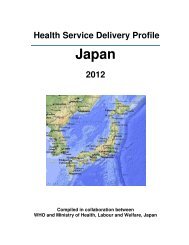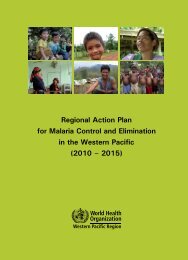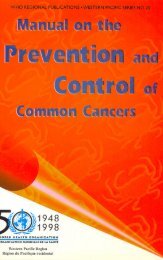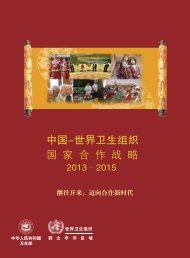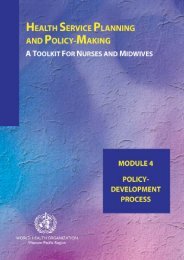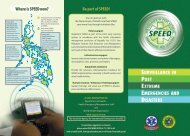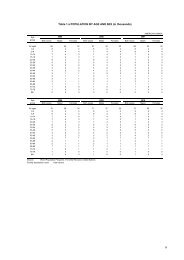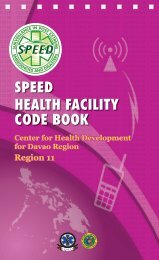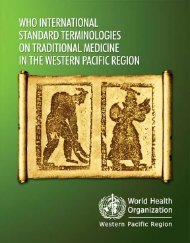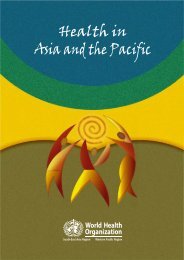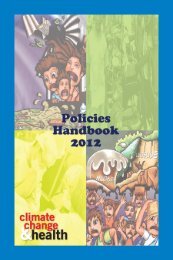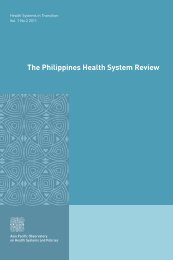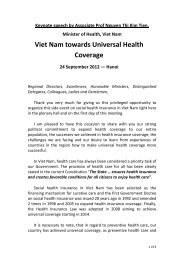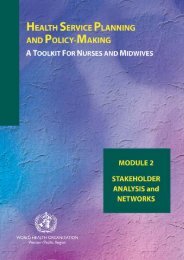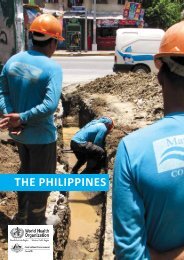monitoring of the who global code of practice on the international ...
monitoring of the who global code of practice on the international ...
monitoring of the who global code of practice on the international ...
You also want an ePaper? Increase the reach of your titles
YUMPU automatically turns print PDFs into web optimized ePapers that Google loves.
THE PHILIPPINE APPROACH<br />
Through <str<strong>on</strong>g>the</str<strong>on</strong>g> ILO DWAB project, and with agreement <str<strong>on</strong>g>of</str<strong>on</strong>g> <str<strong>on</strong>g>the</str<strong>on</strong>g> DOH as <str<strong>on</strong>g>the</str<strong>on</strong>g> lead agency for<br />
<str<strong>on</strong>g>m<strong>on</strong>itoring</str<strong>on</strong>g> <str<strong>on</strong>g>of</str<strong>on</strong>g> <str<strong>on</strong>g>the</str<strong>on</strong>g> Code , a participatory, multistakeholder process was designed in order to<br />
bring around this important issues a wide range <str<strong>on</strong>g>of</str<strong>on</strong>g> stakeholders and opini<strong>on</strong>s(Box 1).<br />
Box 1. The Philippine Approach: Steps in M<strong>on</strong>itoring <str<strong>on</strong>g>the</str<strong>on</strong>g> Implementati<strong>on</strong> <str<strong>on</strong>g>of</str<strong>on</strong>g> <str<strong>on</strong>g>the</str<strong>on</strong>g> WHO<br />
Global Code <str<strong>on</strong>g>of</str<strong>on</strong>g> Practice <strong>on</strong> Internati<strong>on</strong>al Recruitment <str<strong>on</strong>g>of</str<strong>on</strong>g> Health Pers<strong>on</strong>nel (April to<br />
May 2012)<br />
1. ILO’s initiative in hosting <str<strong>on</strong>g>the</str<strong>on</strong>g> 29 March 2012 meeting <str<strong>on</strong>g>of</str<strong>on</strong>g> four partner organizati<strong>on</strong>s -‐DOH,<br />
DOLE, ILO Manila, WHO Philippines and WPRO.<br />
2. Development <str<strong>on</strong>g>of</str<strong>on</strong>g> <str<strong>on</strong>g>the</str<strong>on</strong>g> Philippine framework and approach (Figure 1).<br />
3. Development <str<strong>on</strong>g>of</str<strong>on</strong>g> <str<strong>on</strong>g>the</str<strong>on</strong>g> Philippine <str<strong>on</strong>g>m<strong>on</strong>itoring</str<strong>on</strong>g> worksheet for multistakeholder (inclusive <str<strong>on</strong>g>of</str<strong>on</strong>g> <str<strong>on</strong>g>the</str<strong>on</strong>g><br />
WHO Nati<strong>on</strong>al Reporting Instrument, explanatory notes <strong>on</strong> <str<strong>on</strong>g>the</str<strong>on</strong>g> WHO Code and WHO User’s<br />
Guide <strong>on</strong> <str<strong>on</strong>g>the</str<strong>on</strong>g> Code, and worksheet secti<strong>on</strong>s for supplementary data and clarificati<strong>on</strong> from<br />
stakeholder resp<strong>on</strong>dents (Annex B); and stipulati<strong>on</strong> <str<strong>on</strong>g>of</str<strong>on</strong>g> <str<strong>on</strong>g>the</str<strong>on</strong>g> operati<strong>on</strong>al definiti<strong>on</strong> <str<strong>on</strong>g>of</str<strong>on</strong>g> migrant<br />
health pers<strong>on</strong>nel (DOH definiti<strong>on</strong>).<br />
4. Planning and organizing for <str<strong>on</strong>g>the</str<strong>on</strong>g> <str<strong>on</strong>g>m<strong>on</strong>itoring</str<strong>on</strong>g> process by ILO and DOH, including logistics for<br />
orientati<strong>on</strong> sessi<strong>on</strong>s <strong>on</strong> <str<strong>on</strong>g>the</str<strong>on</strong>g> Code, data collecti<strong>on</strong>, data processing, and multistakeholder’s<br />
c<strong>on</strong>sultative meetings.<br />
5. Multiple meetings for stakeholders’ orientati<strong>on</strong> <strong>on</strong> <str<strong>on</strong>g>the</str<strong>on</strong>g> WHO Code Nati<strong>on</strong>al Reporting<br />
Instrument and <str<strong>on</strong>g>the</str<strong>on</strong>g> Philippine worksheet; and, for stakeholders’ commitment to participate<br />
in <str<strong>on</strong>g>the</str<strong>on</strong>g> data collecti<strong>on</strong> and c<strong>on</strong>sultati<strong>on</strong>s.<br />
6. Multistakeholders’ submissi<strong>on</strong> <str<strong>on</strong>g>of</str<strong>on</strong>g> completed worksheet.<br />
7. C<strong>on</strong>solidati<strong>on</strong> <str<strong>on</strong>g>of</str<strong>on</strong>g> accomplished worksheets.<br />
8. 1st Multistakeholder Meeting was c<strong>on</strong>ducted <strong>on</strong> <str<strong>on</strong>g>the</str<strong>on</strong>g> basis <str<strong>on</strong>g>of</str<strong>on</strong>g> <str<strong>on</strong>g>the</str<strong>on</strong>g> c<strong>on</strong>solidated data and draft<br />
country report.<br />
9. 2nd Multistakeholder Meeting was c<strong>on</strong>ducted for validati<strong>on</strong> <str<strong>on</strong>g>of</str<strong>on</strong>g> <str<strong>on</strong>g>the</str<strong>on</strong>g> draft country report.<br />
10. Online submissi<strong>on</strong> <str<strong>on</strong>g>of</str<strong>on</strong>g> WHO Nati<strong>on</strong>al Reporting Instrument <strong>on</strong> 31 May 2012.<br />
11. Submissi<strong>on</strong> <str<strong>on</strong>g>of</str<strong>on</strong>g> full report <strong>on</strong> <str<strong>on</strong>g>the</str<strong>on</strong>g> M<strong>on</strong>itoring <str<strong>on</strong>g>of</str<strong>on</strong>g> <str<strong>on</strong>g>the</str<strong>on</strong>g> WHO Global Code <str<strong>on</strong>g>of</str<strong>on</strong>g> Practice <strong>on</strong> <str<strong>on</strong>g>the</str<strong>on</strong>g><br />
Internati<strong>on</strong>al Recruitment <str<strong>on</strong>g>of</str<strong>on</strong>g> Health Pers<strong>on</strong>nel: The Philippine Multistakeholder Approach in<br />
June 2012.<br />
12. Preparati<strong>on</strong> <str<strong>on</strong>g>of</str<strong>on</strong>g> a good <str<strong>on</strong>g>practice</str<strong>on</strong>g> sheet documenting <str<strong>on</strong>g>the</str<strong>on</strong>g> entire participatory process in line<br />
with <str<strong>on</strong>g>the</str<strong>on</strong>g> <str<strong>on</strong>g>m<strong>on</strong>itoring</str<strong>on</strong>g> <str<strong>on</strong>g>of</str<strong>on</strong>g> <str<strong>on</strong>g>the</str<strong>on</strong>g> Code and submissi<strong>on</strong> to <str<strong>on</strong>g>the</str<strong>on</strong>g> WHO and ILO in July 2012.<br />
The ILO DWAB hosted <str<strong>on</strong>g>the</str<strong>on</strong>g> initial meeting <strong>on</strong> <str<strong>on</strong>g>the</str<strong>on</strong>g> 29 th <str<strong>on</strong>g>of</str<strong>on</strong>g> March 2012, which was attended by<br />
representatives <str<strong>on</strong>g>of</str<strong>on</strong>g> <str<strong>on</strong>g>the</str<strong>on</strong>g> four partner organizati<strong>on</strong>s—<str<strong>on</strong>g>the</str<strong>on</strong>g> DOH, DOLE, ILO and WHO Philippines<br />
and WPRO. In this meeting, partners discussed <str<strong>on</strong>g>the</str<strong>on</strong>g> Code and its Nati<strong>on</strong>al Reporting<br />
Instrument, and mapped <str<strong>on</strong>g>the</str<strong>on</strong>g> terms <str<strong>on</strong>g>of</str<strong>on</strong>g> <str<strong>on</strong>g>the</str<strong>on</strong>g>ir collaborative engagement to assist <str<strong>on</strong>g>the</str<strong>on</strong>g> DOH in<br />
<str<strong>on</strong>g>m<strong>on</strong>itoring</str<strong>on</strong>g> <str<strong>on</strong>g>the</str<strong>on</strong>g> Code. It was agreed <str<strong>on</strong>g>the</str<strong>on</strong>g>n that much value would be added to <str<strong>on</strong>g>the</str<strong>on</strong>g> report by<br />
inviting a wide range <str<strong>on</strong>g>of</str<strong>on</strong>g> stakeholders to <str<strong>on</strong>g>the</str<strong>on</strong>g> table. It was also agreed that, such an open and<br />
participative process would raise awareness and interest <str<strong>on</strong>g>of</str<strong>on</strong>g> <str<strong>on</strong>g>the</str<strong>on</strong>g> issue <str<strong>on</strong>g>of</str<strong>on</strong>g> ethical recruitment<br />
and <str<strong>on</strong>g>the</str<strong>on</strong>g> Code itself. The ILO <str<strong>on</strong>g>of</str<strong>on</strong>g>fered its experience in dealing with social partners to <str<strong>on</strong>g>the</str<strong>on</strong>g><br />
benefit <str<strong>on</strong>g>of</str<strong>on</strong>g> <str<strong>on</strong>g>the</str<strong>on</strong>g> <str<strong>on</strong>g>m<strong>on</strong>itoring</str<strong>on</strong>g> <str<strong>on</strong>g>of</str<strong>on</strong>g> <str<strong>on</strong>g>the</str<strong>on</strong>g> Code. As <str<strong>on</strong>g>the</str<strong>on</strong>g> ILO main governmental partner and agency<br />
3



